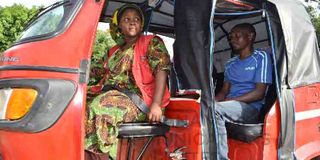How self-confidence pays in life

Ms Nisse Donald, a tricycle driver in Dodoma, poses for a photo with her passenger. She says he wishes she could buy her own bajaj as she aspires to be self-employed and manager her own business. PHOTO | BEN PATRICK
What you need to know:
Ms Nisse Donald shares her life story as a single parent and encourages other women of her age to take a leaf from her for there are many job opportunities to make one earn a living and take care of one’s family
Dodoma. It’s a beautiful morning in the designated city of Dodoma and as usual, everyone is busy working or going to work.
A young woman with a smiling face waits for travellers to use her tricycle (Bajaj)!
Ms Nisse Helga Donald, a mother of two, a widow, a hotel manager and an accountant, has decided to try to do what other women wouldn’t like to try. At her mid-30s, she has a long story to tell young women of her age.
“My husband died two years ago and left me with nothing to help me and my children,” she calmly said, when I asked her about her past and how she decided to be a Bajaj driver in the city. She was born in Dar es Salaam 36 years ago. She started primary education at Mbuyuni Primary School and then went to Sagatini –Ugweno for secondary education (O-Level). She later joined Mruma Girls in Same Districts for her A-Level.
She possesses various professional credentials, including a diploma in hotel management, which she obtained at Tema School of Hotel Management (Nyegezi–Mwanza) in the early 2000s.
After finishing her studies, she worked at various hotels in Dar es Salaam and Zanzibar, but she realised that hotel work did not earn her much.
“I had a glittering career there, but decided to quit after few years because I saw no future in the hospitality industry, “she described. Ms Donald decided to enroll herself in an accountancy course with the National Board of Accountants and Auditors, where she pursued her studies with a view to becoming an accountant.
But the journey was not successful. She had to terminate her studies. Then, she decided to go to Zanzibar to work as a cashier at various hotels.
She cherished her life in Zanzibar and worker hard, but due to family problems she decided to leave for Dodoma, where her mother lived after breaking up with her father.
In Dodoma, she met with her late husband and she decided to settle and make a family.
“My daddy was a director at one of the government institutions, so I had everything that I wanted before I left home to live with my husband.” Unfortunately, her husband died in car accident in 2014. Ms Donald had to cope with life as a single parent.
She says the death of her lovely husband affected her very much.
But then she had to learn how to live as a single parent with her two children: Junior (12) and Abbigail (4). “After my husband’s death I had nothing to do to help my family to survive. So, I decided to go back to my mother’s house,” she recalled.
She said after living with her mother for sometime, she felt bored and decided to rent her own room away from her mother’s house, where she started a new life. She says after renting the room, her mother had little to help her at the beginning. This made her spent many sleepless nights thinking how to survive. “It was a difficult time for me at the beginning. Although I applied to various places for a job I couldn’t get any,” she said.
She, however, believed there were a lot of opportunities around Dodoma Municipal Council brought about by population increase because of the relocation of the government’s capital. She took her time especially on weekends to study what she could do and make her self-reliant.
“I finally decided to become a Bajaj driver because I used to drive home cars and I had my driving licence. So, I was very sure that I would not fail to drive it. That was early last year,” she said. That was a turning point for her. Ms Donald says at the beginning it was not easy for her to copy with her new office due to gender stereotyping, but she kept her head up as she felt that there was no turning back.
“It took time to adapt to this new job. I was very slow, so I would miss travellers on the road. Men because they are used to it rushed and took every person, who wanted to be taken somewhere,” she described.
The carelessness of some motorcyclists and tricycle drivers deepened the toughness of her daily routine. The situation on the road decreased her morale of work, but when she considered her children back home she took courage.
She says she was very frustrated on her first day, as she failed to get the money she had agreed to raise per day with the owner of the tricycle. According to her, she was supposed to take to the owner Sh20,000, but she would only manage to have Sh15,000.
“That first night I did not sleep, I was worried that the owner would take back his tricycle because I had failed to fulfil the agreement,” she said. But she said the owner understood the situation and he encouraged her to work harder since she had decided to do the job. As days passed by, she learned the ups and downs of the businesses and managed to cope with the challenging situation.
People including her neighbours, who used to laugh at her now started changing their mind-set. “I always thank my mother and all good people around me. They encouraged me to go ahead with my new job,” she said.
That was how she entered the business. She is now very confident in her job as through it she can take care of her family - her children Abigail and Junior are now in Standard Seven. Ms Donald is now an experienced bajaj driver, but she wishes she could have her own tricycle.
“When my husband died we hadn’t yet own our house. So, if I have my own bajaj it could help me have extra money to support my family, including building a good house,” she explained.
She said she wished she would have a contract with a person, who had a bajaj, which after sometime she owned it as other bajaj drivers do. “If I get one for sure my life will change,” she said.
However, she calls for educated women, who look for jobs in the formal sector not to waste their time as there are many opportunities that can enable them to make ends meet. “It is high time women stopped being selective. There are many opportunities, but most of the women want white-collar jobs , which are very limited,” she advised.


